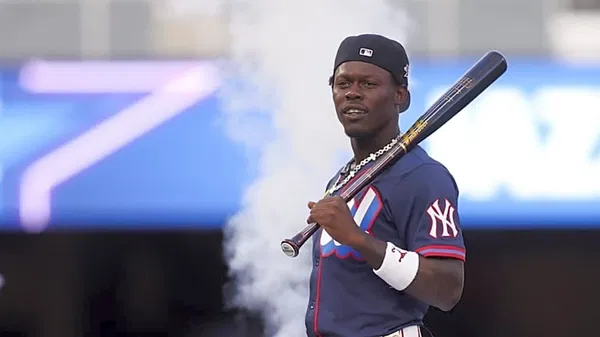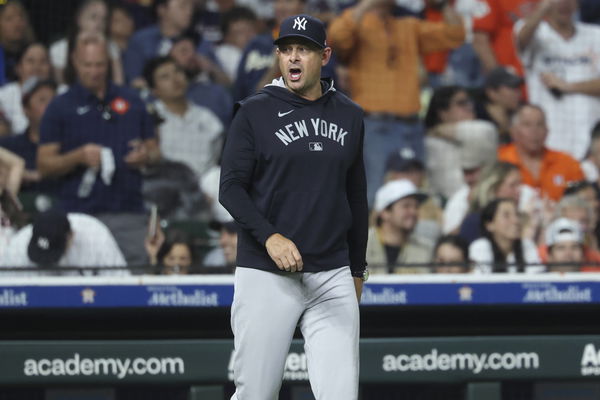
Imago
Image Credits: Brett Davis-Imagn Images

Imago
Image Credits: Brett Davis-Imagn Images
What looked like a matchup-driven tactical choice has now become one of the most hotly debated decisions of the Yankees’ postseason run. Aaron Boone shocked fans and veterans alike by sitting Jazz Chisholm Jr. in Game 1 against the Red Sox. Chisholm, who had just taken a pitch off his forearm in the Orioles series, was cleared to play, but Boone opted to go with Amed Rosario instead. The move immediately raised eyebrows inside the clubhouse, with multiple veterans reportedly furious over benching one of the team’s most electric hitters.
Watch What’s Trending Now!
Boone later revealed his reasoning: “Jazz is doing well… but as tough as [Garrett] Crochet is, he’s been especially tough on lefties. Amed does have some good history with him. Has hit him well and faced him a lot this year. I felt like I wanted that extra right-handed bat in there.” The numbers back Boone’s explanation. Since 2024, Chisholm has had four at-bats against Crochet, going hitless with three strikeouts and a .200 OBP. Rosario, meanwhile, has managed better production against right-handers this season, hitting .231 with 2 HRs and 8 RBIs in 69 plate appearances. Boone’s gamble was meant to buy a matchup edge and keep Chisholm fresh for later in the series. But instead of praise, the call ignited clubhouse frustration and, ultimately, put Boone under fire.
Now, Aaron Boone himself has admitted what many already suspected, that it was a costly miscalculation. Greg Joyce posted on Twitter, “Aaron Boone said if there was one decision he second-guessed from last night, it’s whether he should have kept Rosario in the game (instead of using Jazz for defense in the top of the eighth, leading to an AB against Chapman in the ninth).” The mistake not only changed the lineup balance but also opened the door to a disastrous late-game scenario, which left veterans furious in the dugout.
Aaron Boone said if there was one decision he second-guessed from last night, it’s whether he should have kept Rosario in the game (instead of using Jazz for defense in the top of the eighth, leading to an AB against Chapman in the ninth).
— Greg Joyce (@GJoyce9) October 1, 2025
Boone has tried to get ahead of the backlash by keeping communication lines open with his players. As Greg Joyce posted, “Boone said he spoke with Jazz on Monday and explained why he was considering not having him in the lineup for Game 1. ‘I don’t need him to put a happy face on it right now. I need him to go play his tail off, which I know he’s gonna do.’” This acknowledgment shows Boone’s balancing act: sticking to analytics-driven matchups while also managing personalities in a clubhouse already under postseason pressure. The bigger question now is whether his veterans will forgive the move if the Yankees fail to get past the Red Sox.
In simple terms, Boone is walking a tightrope. On one hand, he’s trying to make the smartest matchup calls possible with the numbers in front of him. On the other hand, he has to keep a star like Jazz Chisholm Jr. motivated and ready to perform. Sitting him in such a crucial game and then admitting he might have overthought the decision, only fuels the narrative that Boone’s reliance on matchups sometimes comes at the cost of clubhouse trust. For the Yankees’ playoff hopes to stay alive, Boone will need Chisholm firing at full strength—and his veterans buying into his leadership again.
While Boone’s handling of Jazz Chisholm Jr. has already stirred anger in the Yankees’ clubhouse, the fallout from this decision raises a much bigger question about his future in the Bronx.
Will the Yankees fire Aaron Boone?
Boone entered the postseason with a relatively secure job, according to The Athletic’s MLB insider Ken Rosenthal. Within his report, Rosenthal placed Boone under the “Would take something calamitous” section of a story outlining MLB teams that could make a managerial change. While an early elimination by a rival could certainly qualify as “calamitous,” Rosenthal also noted Boone’s strong working relationship with Yankees GM Brian Cashman, which continues to provide him stability.
Despite his postseason shortcomings, Boone’s regular-season record paints a different picture. Since 2018, the Yankees have posted the third-best winning percentage in baseball (.584), trailing only the Dodgers and Astros. Yet the comparison cuts both ways—those two franchises have won titles in the same period, while Boone’s Yankees have fallen short year after year.

Imago
MLB, Baseball Herren, USA New York Yankees at Houston Astros Sep 3, 2025 Houston, Texas, USA New York Yankees manager Aaron Boone looks towards home plate during a pitching change in the eighth inning against the Houston Astros at Daikin Park. Houston Daikin Park Texas USA, EDITORIAL USE ONLY PUBLICATIONxINxGERxSUIxAUTxONLY Copyright: xTroyxTaorminax 20250903_tjt_at5_0049
Helping Boone’s case for 2026 is the health narrative. New York played nearly the entire 2025 campaign without ace Gerrit Cole (Tommy John surgery), while Giancarlo Stanton missed the first 70 games, and Aaron Judge battled injuries throughout. Cashman may weigh these setbacks when deciding whether a Wild Card loss to the Red Sox justifies moving on.
In February, Boone signed a two-year extension that keeps him under contract through 2027. However, his overall postseason record remains underwhelming: 0-1 in the AL Wild Card, 4-2 in the ALDS, 1-3 in the ALCS, and 0-1 in the World Series. For a franchise built on October success, that résumé is increasingly hard to defend—making Boone’s margin for error razor-thin despite the extension.
Aaron Boone’s gamble with Jazz Chisholm Jr. was supposed to be a matchup-driven masterstroke, but it instead triggered frustration inside the Yankees’ clubhouse and second-guessing from the skipper himself. While Boone’s regular-season record and strong rapport with Brian Cashman give him some cushion, the lack of October success continues to cast a shadow over his tenure.
With veterans openly questioning his decisions and another postseason setback looming large, Boone’s margin for error is thinner than ever. If the Yankees fail to advance, his controversial handling of Chisholm may be remembered not just as a costly mistake—but as the turning point that forced the organization to finally rethink its leadership.

